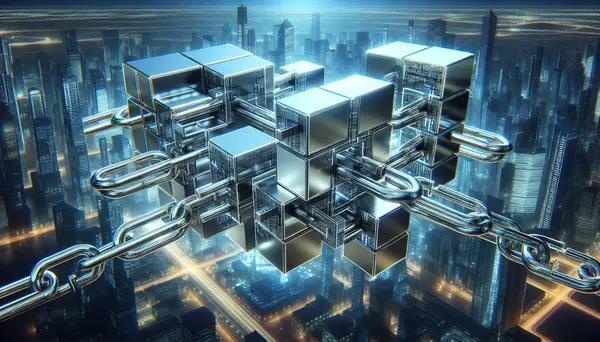Posts on the Topic Future of Blockchain

Blockchain technology, initially created for digital currency transactions like Bitcoin, is now impacting mobile applications by providing a secure and decentralized database system. This advancement enhances app security, reduces data breach risks, increases transparency with an immutable ledger accessible to...

Blockchain startups are driving innovation by using decentralized technology to enhance security and efficiency across various industries, with their growth laying the foundation for a more interconnected digital economy. Investment trends show increasing diversification and capital inflow into blockchain infrastructure,...

Blockchain sustainability focuses on using blockchain technology to support eco-friendly initiatives, with an emphasis on reducing environmental impacts and creating transparent systems for conservation. The article discusses the energy consumption of different consensus mechanisms like PoW and PoS, Ethereum's shift...

Blockchain open source projects are crucial for the development of transparent and trustworthy distributed ledger technologies, enabling collaboration on consensus mechanisms like PoW and PoS to enhance system robustness. These projects support a range of applications across industries by leveraging...

Blockchain technology is a decentralized and secure method of recording transactions across multiple computers, ensuring data integrity without central authority. It has evolved from supporting Bitcoin to having the potential to disrupt various industries with its immutable ledger system, offering...

The article discusses the synergistic relationship between blockchain and AI, known as Blockchain X AI, which enhances innovation through secure record-keeping and advanced analytics. This combination leads to efficient solutions across industries like supply chain management, financial services, and healthcare...

Blockchain technology underpins a digital revolution, enabling secure and transparent transactions that could transform various sectors beyond cryptocurrencies. These projects aim to create decentralized applications with benefits like censorship resistance and operational efficiency while also facing challenges such as scalability...

The article discusses Europe's commitment to integrating blockchain technology as a key driver for innovation, economic growth, and societal advancement. It highlights the European Blockchain Partnership's efforts in establishing the European Blockchain Services Infrastructure (EBSI) and various initiatives like INATBA...

Blockchain APIs are essential for developers to interact with blockchain networks, simplifying the creation of decentralized apps and integration into existing systems. They enable a broader audience to access blockchain technology by facilitating transactions, data manipulation, and interoperability across various...

Berlin has transformed into a hub for blockchain innovation, attracting global talent and investment while fostering economic growth through diverse applications of the technology. The city's collaborative startup ecosystem and regular events support networking and knowledge sharing within the blockchain...

Blockchain Ki combines blockchain's secure, transparent ledger with AI's predictive and automation capabilities to create smarter, more efficient networks that can dynamically adjust protocols for faster transactions and reduced energy use. This integration leads to practical applications like self-updating smart...

A blockchain network is a decentralized and distributed digital ledger that records transactions across multiple computers, ensuring data cannot be manipulated or falsified. Blockchain networks have immense potential in various industries due to their transparency, resistance to fraud, ability to...

Blockchain technology, a decentralized ledger that records transactions across multiple computers, offers transparency and security making it nearly impossible for data tampering or fraud. Its applications extend beyond cryptocurrencies to sectors like banking, e-commerce, voting systems and healthcare by providing...

Blockchain technology and renewable energy have the potential to work together to create a more sustainable future. Blockchain's decentralized nature complements the distributed nature of renewable energy resources, allowing for decentralized energy production and consumption. It can also improve energy...

This article explores the potential applications of blockchain technology beyond cryptocurrency. It discusses how blockchain can be used in supply chain management, healthcare, financial services, voting, and identity verification, highlighting the benefits it can bring to these industries such as...

Cryptocurrencies and sustainability can coexist through various measures. Transitioning to renewable energy sources for mining operations, shifting from Proof of Work to Proof of Stake consensus algorithms, and using blockchain technology for supply chain tracking and peertopeer energy trading are...

Blockchain technology's energy consumption is high due to the mining process, particularly in Proof of Work systems where miners solve complex puzzles using significant computational power and electricity. Innovations like Proof of Stake aim to reduce this footprint by decreasing...

NFTs, or Non-Fungible Tokens, are unique digital assets secured by blockchain technology that represent a new way of owning and valuing items like art and music. They have disrupted the traditional art market by allowing artists to directly monetize their...

Blockchain technology, initially created for digital currency transactions like Bitcoin, is now impacting mobile applications by providing a secure and decentralized database system. This advancement enhances app security, reduces data breach risks, increases transparency with an immutable ledger accessible to...

Blockchain startups are driving innovation by using decentralized technology to enhance security and efficiency across various industries, with their growth laying the foundation for a more interconnected digital economy. Investment trends show increasing diversification and capital inflow into blockchain infrastructure,...

Blockchain sustainability focuses on using blockchain technology to support eco-friendly initiatives, with an emphasis on reducing environmental impacts and creating transparent systems for conservation. The article discusses the energy consumption of different consensus mechanisms like PoW and PoS, Ethereum's shift...

Blockchain open source projects are crucial for the development of transparent and trustworthy distributed ledger technologies, enabling collaboration on consensus mechanisms like PoW and PoS to enhance system robustness. These projects support a range of applications across industries by leveraging...

Germany is at the forefront of blockchain technology, integrating it across various sectors and becoming a significant player in this field. The rise of German blockchain companies has been supported by government policies and a robust tech sector, with firms...

Blockchain technology is a decentralized and secure method of recording transactions across multiple computers, ensuring data integrity without central authority. It has evolved from supporting Bitcoin to having the potential to disrupt various industries with its immutable ledger system, offering...

The article discusses the synergistic relationship between blockchain and AI, known as Blockchain X AI, which enhances innovation through secure record-keeping and advanced analytics. This combination leads to efficient solutions across industries like supply chain management, financial services, and healthcare...

Blockchain technology underpins a digital revolution, enabling secure and transparent transactions that could transform various sectors beyond cryptocurrencies. These projects aim to create decentralized applications with benefits like censorship resistance and operational efficiency while also facing challenges such as scalability...

The article discusses Europe's commitment to integrating blockchain technology as a key driver for innovation, economic growth, and societal advancement. It highlights the European Blockchain Partnership's efforts in establishing the European Blockchain Services Infrastructure (EBSI) and various initiatives like INATBA...

Blockchain APIs are essential for developers to interact with blockchain networks, simplifying the creation of decentralized apps and integration into existing systems. They enable a broader audience to access blockchain technology by facilitating transactions, data manipulation, and interoperability across various...

Berlin has transformed into a hub for blockchain innovation, attracting global talent and investment while fostering economic growth through diverse applications of the technology. The city's collaborative startup ecosystem and regular events support networking and knowledge sharing within the blockchain...

Blockchain Ki combines blockchain's secure, transparent ledger with AI's predictive and automation capabilities to create smarter, more efficient networks that can dynamically adjust protocols for faster transactions and reduced energy use. This integration leads to practical applications like self-updating smart...

Blockchain operating systems, similar to traditional ones like Windows or Linux, serve as a platform for computers and other devices but use decentralized networks instead of centralized data. This new type of system offers increased security, transparency and efficiency by...

A blockchain network is a decentralized and distributed digital ledger that records transactions across multiple computers, ensuring data cannot be manipulated or falsified. Blockchain networks have immense potential in various industries due to their transparency, resistance to fraud, ability to...

Blockchain technology, a decentralized ledger that records transactions across multiple computers, offers transparency and security making it nearly impossible for data tampering or fraud. Its applications extend beyond cryptocurrencies to sectors like banking, e-commerce, voting systems and healthcare by providing...

Blockchain technology and renewable energy have the potential to work together to create a more sustainable future. Blockchain's decentralized nature complements the distributed nature of renewable energy resources, allowing for decentralized energy production and consumption. It can also improve energy...

Blockchain technology has the potential to revolutionize intellectual property protection by providing a transparent and immutable record of IP rights. It eliminates the need for intermediaries, allows for efficient transactions, and enables easier tracking of IP rights usage. However, there...

The article introduces the concept of blockchain and its potential role in digital identity management. It highlights the flaws in traditional identity verification methods and the challenges associated with managing digital identities. The article also discusses the pros and cons...

This article explores the potential applications of blockchain technology beyond cryptocurrency. It discusses how blockchain can be used in supply chain management, healthcare, financial services, voting, and identity verification, highlighting the benefits it can bring to these industries such as...

Cryptocurrencies and sustainability can coexist through various measures. Transitioning to renewable energy sources for mining operations, shifting from Proof of Work to Proof of Stake consensus algorithms, and using blockchain technology for supply chain tracking and peertopeer energy trading are...
Unsere Beiträge zum Thema Future of Blockchain
Exploring the Future of Blockchain unveils a tapestry of innovation and transformative potential within various industries. This category dives deep into the prospects that blockchain technology holds, drawing a clear picture of how it could revolutionize the world as we know it. By engaging with our insightful articles, you will discover how blockchain has the power to enhance security, boost efficiency, and foster trust across numerous transactions and systems.
Understanding the Future of Blockchain is crucial for anyone looking to stay ahead in the rapidly evolving digital landscape. Our articles not only explore possible advancements and applications but also assess the challenges and ethical considerations that come with them. Each piece is crafted with a focus on shedding light on the strategic impact that blockchain can have on economies, governance, and society at large.
Arm yourself with knowledge about the Future of Blockchain and you will empower yourself with the foresight to make informed decisions and seize opportunities. Readers who engage deeply with the material presented in this category can expect to gain a comprehensive overview of upcoming trends, potential use cases, and innovative projects that could redefine existing paradigms. The future is being written one block at a time, and through these articles, you'll have a front-row seat to witness the shaping of tomorrow's digital frontier.








